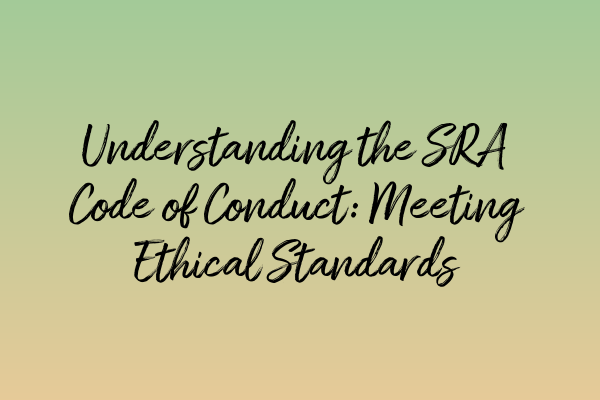Understanding the SRA Code of Conduct: Meeting Ethical Standards
Introduction:
As a solicitor and legal professional, it is crucial to maintain the highest ethical standards in the practice of law. The Solicitors Regulation Authority (SRA) has established a comprehensive Code of Conduct that outlines the ethical obligations solicitors must adhere to. In this blog post, we will delve deep into the SRA Code of Conduct to help you understand its intricacies and ensure you meet the required ethical standards in your legal practice.
1. Upholding the Rule of Law and the Administration of Justice:
At the heart of the SRA Code of Conduct lies the principle of upholding the rule of law and the administration of justice. This means that solicitors must act with integrity, maintain the public’s trust in the legal profession, and promote the proper functioning of the legal system. By following this fundamental principle, solicitors contribute to a fair and just society.
2. Acting in the Client’s Best Interests:
As a solicitor, your primary duty is to act in your client’s best interests. This encompasses not only providing competent legal advice but also ensuring that you avoid any conflicts of interest that may compromise your ability to act solely in your client’s favor. You must also maintain client confidentiality and protect their interests diligently throughout the legal process.
3. Maintaining Independence and Integrity:
Integrity is the cornerstone of the legal profession, and solicitors must maintain their independence and act with honesty and integrity at all times. This includes being transparent in your dealings, avoiding any inappropriate influence, and upholding your professional standards even in the face of challenges or conflicts.
4. Providing a Proper Standard of Service:
The SRA Code of Conduct emphasizes the importance of providing a proper standard of service to clients. This entails communicating effectively, managing your clients’ expectations, and delivering legal services in a timely and competent manner. By consistently providing a high standard of service, you not only meet your ethical obligations but also enhance your professional reputation.
5. Dealing with Other Parties and the Courts:
In addition to your obligations towards clients, the SRA Code of Conduct also addresses your interactions with other parties involved in legal proceedings and the courts. You must treat all individuals with respect, courtesy, and honesty, including opposing parties, witnesses, and court personnel. By maintaining professionalism in your interactions, you contribute to the smooth functioning of the legal system.
Conclusion:
Understanding and embracing the SRA Code of Conduct is essential for solicitors seeking to maintain the highest ethical standards in their legal practice. By upholding the rule of law, acting in the client’s best interests, maintaining independence and integrity, providing a proper standard of service, and dealing with others in a professional manner, solicitors can meet their ethical obligations and contribute to a just and fair legal system.
For related articles, please click on the links below:
– Private Prosecutions: Exploring Non-Governmental Prosecutions in Criminal Cases
– Demystifying Criminal Law Procedures: A Step-by-Step Guide
– Rights of the Accused: Protecting Individual Liberties in Criminal Proceedings
– Magistrates’ Court vs Crown Court: Understanding Key Differences
– Protecting Vulnerable Witnesses in Criminal Trials: Best Practices and Legal Safeguards


Leave a Reply